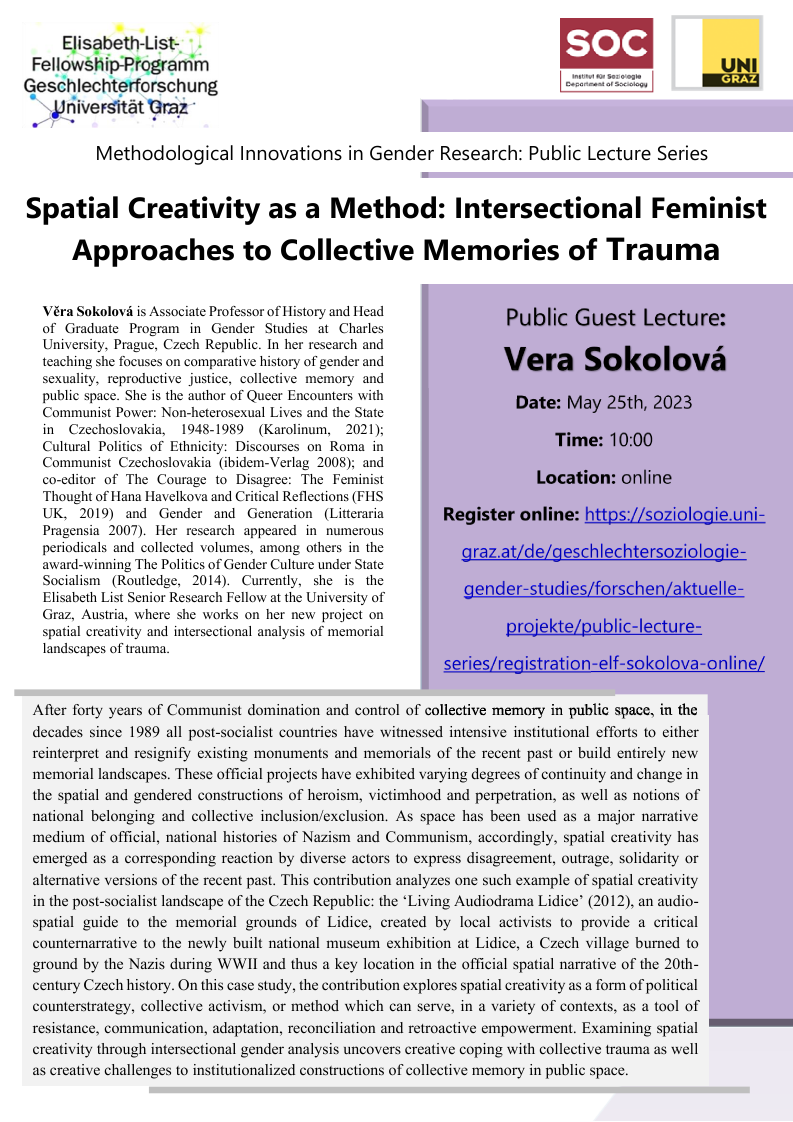After forty years of Communist domination and control of collective memory in public space, in the decades since 1989 all post-socialist countries have witnessed intensive institutional efforts to either reinterpret and resignify existing monuments and memorials of the recent past or build entirely new memorial landscapes. These official projects have exhibited varying degrees of continuity and change in the spatial and gendered constructions of heroism, victimhood and perpetration, as well as notions of national belonging and collective inclusion/exclusion. As space has been used as a major narrative medium of official, national histories of Nazism and Communism, accordingly, spatial creativity has emerged as a corresponding reaction by diverse actors to express disagreement, outrage, solidarity or alternative versions of the recent past. This contribution analyzes one such example of spatial creativity in the post-socialist landscape of the Czech Republic: the ‘Living Audiodrama Lidice’ (2012), an audio-spatial guide to the memorial grounds of Lidice, created by local activists to provide a critical counternarrative to the newly built national museum exhibition at Lidice, a Czech village burned to ground by the Nazis during WWII and thus a key location in the official spatial narrative of the 20th-century Czech history. On this case study, the contribution explores spatial creativity as a form of political counterstrategy, collective activism, or method which can serve, in a variety of contexts, as a tool of resistance, communication, adaptation, reconciliation and retroactive empowerment. Examining spatial creativity through intersectional gender analysis uncovers creative coping with collective trauma as well as creative challenges to institutionalized constructions of collective memory in public space.
Věra Sokolová is Associate Professor of History and Head of Graduate Program in Gender Studies at Charles University, Prague, Czech Republic. In her research and teaching she focuses on comparative history of gender and sexuality, reproductive justice, collective memory and public space. She is the author of Queer Encounters with Communist Power: Non-heterosexual Lives and the State in Czechoslovakia, 1948-1989 (Karolinum, 2021); Cultural Politics of Ethnicity: Discourses on Roma in Communist Czechoslovakia (ibidem-Verlag 2008); and co-editor of The Courage to Disagree: The Feminist Thought of Hana Havelkova and Critical Reflections (FHS UK, 2019) and Gender and Generation (Litteraria Pragensia 2007). Her research appeared in numerous periodicals and collected volumes, among others in the award-winning The Politics of Gender Culture under State Socialism (Routledge, 2014). Currently, she is the Elisabeth List Senior Research Fellow at the University of Graz, Austria, where she works on her new project on spatial creativity and intersectional analysis of memorial landscapes of trauma.
